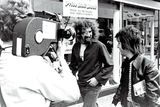Civil War review: Alex Garland's dystopian road movie lacks heart
Cert 15A; Now showing


Show, don’t tell, is one of the golden rules laid out early in fiction-writing courses. It’s perhaps the kind of thing that Alex Garland might have had taped above the computer during his pre-film-making days as a (very successful) novelist.
Across 300 pages, with time and space to let ideas coagulate, showing and not telling is a wise policy. But what about in a motion picture, where you’ve only got 100 minutes to make us invest in characters moving from point A to point B? A little bit of “telling” can be very useful in helping us get a real feel for the world in which the story takes place.
The UK writer-director’s fourth directorial outing is a dystopian road movie. The plot follows a small team of war journalists (led by Kirsten Dunst’s gritty war photographer) travelling to cover the overthrow of a three-term US president (Nick Offerman) and his fascist methodologies. Along the way, they run into a range of dangers, from gun-toting hillbillies to Jesse Plemons’s xenophobic militiaman.
Journalists 'have been under attack', Civil War director says
The grand backdrop to the characters’ fears and ideals is a conspicuously recognisable and proximate America that has torn itself apart. We know that states have clumped themselves into separate factions, with one having taken power and dismantled the constitution to hold on to it.
Someone mentions something about “the Antifa Massacre” and that the FBI has been abolished. Other than that, the breakdown of the most influential democracy in the world is left as something loosely defined, a phenomenon that we needn’t get too bogged down in the details of, Garland feels. The United States aren’t so united any longer and it’s for us to imagine the particulars of that disintegration.
Civil War is not a film that many will be able to look away from. It takes Garland’s skill for visceral action and places it within a dystopian premise that is unnervingly close to hand. We’re given a plausible culmination of the inflammatory culture wars that still rage across social media.
Searing set-pieces bring to life the conditions these journalists have grown addicted to. But it is also a film that wants to have it both ways – to be both a vague cautionary allegory about the direction we are headed if we don’t learn to listen to one another, while also a pointed jab at one particular side in a very real America.
'Civil War' is full of thrills
It opens with a televised address by the incumbent commander-in-chief, a hirsute, media-savvy ham rehearsing his lines and ensuring to get superlatives and hyperbole into the spiel. Even if Garland and Offerman aren’t winking at a certain orange-skinned candidate currently seeking re-election, we can’t help but go there because he’s left it for us to fill in these gaps.
We then hit the ground with a road trip through this shapeless heart of darkness. Colleagues Lee (Dunst) and Joel (Wagner Moura) have teamed up with an old-school war journalist (Stephen McKinley Henderson) and Jessie (Cailee Spaeny), who wants to earn her stripes as a budding war snapper. They’ve been tipped off that the Texas-California alliance is advancing on the White House to topple Offerman’s premier. If history is about to be made, Lee wants to be the one to shoot it.
Read more
An urgent rendezvous, you assume, but Civil War then morphs into a tiring sequence of diversions as our road trippers seem eager to turn off the highway at the slightest glimpse of any signs saying “ominous dystopian jeopardy this way”. On backwoods lanes and quiet gas stations, they find tooled-up hillbillies hanging petty criminals and digging mass graves for people of colour. When they peel off to tail a vicious gunfight, we’re not told if this a key battle line in America’s second dalliance with civil war, or just people shooting at each other.
Put simply, there is no sense of the stakes behind the overarching war. Instead of painting a future hell that has turned brother against brother, we just get a haunted house with a different novelty ghoul behind each door. It makes Civil War a strangely distant and uninvolving action-thriller that leaves little to grab on to other than slick military kablamo and a piecemeal yarn about a throwback war photographer – Lee is all but missing an eye patch – passing the baton.
Dunst, Offerman, and McKinley Henderson all put their back into it, and there is some real firepower in the finale. But in keeping his tale’s background at arm’s length, Garland has inadvertently left its heart there too.
Join the Irish Independent WhatsApp channel
Stay up to date with all the latest news

















